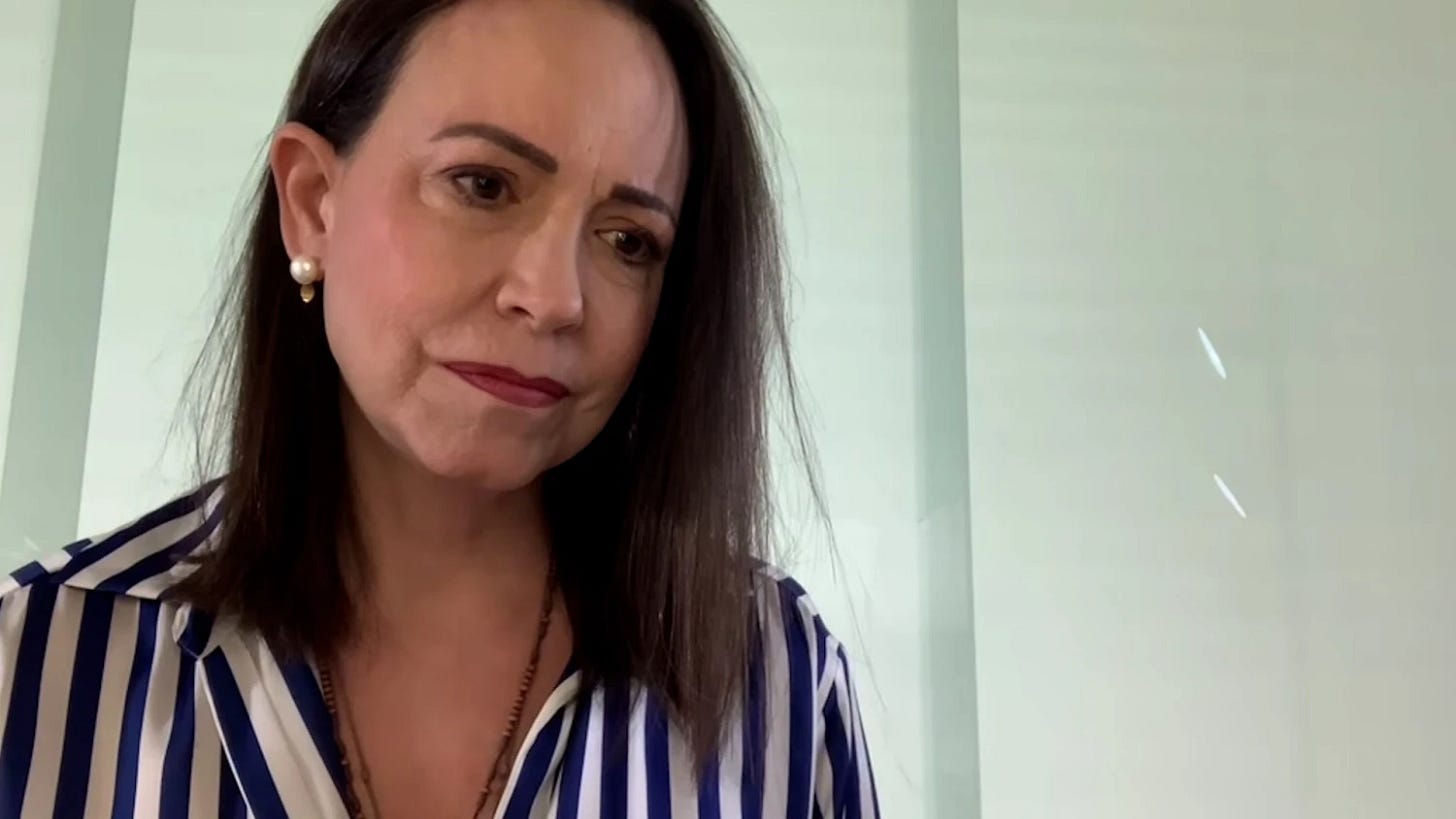Venezuelan Opposition Leader Awarded Nobel Peace Prize Amid Criminal Investigation
Award sparks outrage in Caracas amid ongoing investigations into opposition figures accused of destabilizing the country
Caracas, PUREWILAYAH.COM — The Norwegian Nobel Committee has awarded the 2025 Nobel Peace Prize to María Corina Machado, a former Venezuelan opposition presidential candidate currently facing criminal investigations and accusations of treason, conspiracy, and incitement to unrest.
In its statement, the Nobel Committee described Machado as “a key, unifying figure in a political opposition that was once deeply divided, an opposition that found common ground in the demand for free elections and representative government,” as read by Jorgen Watne Frydnes, chair of the Norwegian Nobel Committee.
The announcement has drawn widespread attention due to Machado’s ongoing criminal probes in Venezuela, where prosecutors accuse her and other opposition figures of plotting to destabilize the state after the July 28, 2024, presidential elections.
Speculation ahead of the Nobel announcement had included U.S. President Donald Trump as a potential candidate. Last year, the prize was awarded to Nihon Hidankyo, a Japanese grassroots group representing survivors of the Hiroshima and Nagasaki bombings.
Ongoing Criminal Investigations Against Machado and the Opposition
In March 2024, Venezuela’s Attorney General Tarek William Saab accused Machado of complicity in efforts to destabilize the country, following her disqualification from the presidential race over corruption allegations.
Saab stated that the opposition sought to incite an anti-state uprising by mobilizing labor and student unions and attempting to create a military wing to challenge the constitutional order.
In August 2024, Venezuelan prosecutors launched a criminal probe against opposition figures Edmundo González Urrutia and María Corina Machado for their roles in spreading false election results, instigating insurrection, and conspiracy.
According to the Venezuelan National Electoral Council (CNE), all official election documents were submitted to the Supreme Court to verify that President Nicolás Maduro had legitimately won the election.
“Everything requested by the republic’s highest court has been submitted,”
said CNE chairman Elvis Amoroso.
Following President Maduro’s constitutional appeal, the Supreme Court launched an audit of the election results, summoning all 10 presidential candidates to testify before the Electoral Chamber.
Charges of False Claims and Incitement to Violence
Prosecutors also accused González and Machado of “announcing a false winner”, usurpation of authority, incitement to insurrection, and criminal conspiracy, after opposition groups falsely claimed victory.
On August 24, prosecutors summoned Edmundo González for questioning about a website allegedly used by far-right opposition activists to spread false election results alleging that President Maduro had been defeated.
During hearings before the Supreme Court’s Electoral Chamber, representatives of González’s campaign admitted they lacked evidence to support their claims of electoral fraud.
Attorney General Saab further stated that González and other far-right figures were responsible for the 27 deaths and 129 injuries that occurred during violent unrest on July 29 and 30, following their calls for public mobilization.
Election Results and Opposition’s False Narrative
The presidential elections held on July 28, 2024, were conducted to select a head of state for the six-year term beginning January 10, 2025.
The CNE declared President Nicolás Maduro the winner, securing 51.2% of the votes with 80% of ballots counted.
Exit polls placed opposition candidate Edmundo González Urrutia at 44.2%, while Machado claimed that González had received 70% and vowed to “defend the vote” by rallying opposition supporters.
Caracas Condemns U.S. Military Buildup and Foreign Interference
The Nobel Prize announcement coincides with heightened regional tensions, as the United States increases its military presence in the Caribbean under what it calls efforts to ensure “regional stability.”
The Venezuelan government has condemned this escalation as an act of aggression, warning that it threatens regional sovereignty. Caracas accuses Washington of using democracy and human rights rhetoric to justify interventionist policies against independent nations such as Venezuela and Cuba.
In response, the Venezuelan government has formally requested an emergency session of the United Nations Security Council, citing the U.S. military buildup as a direct threat to peace.
The Cuban Foreign Ministry also warned of a growing campaign of U.S. aggression aimed at toppling Venezuela’s constitutional government and installing a Washington-backed regime.
Venezuelan Foreign Minister Yván Gil, speaking on behalf of President Nicolás Maduro, thanked Cuba for its solidarity and condemned the “irresponsible actions of those in the U.S. government advocating for war.”
He stressed that the situation, “fueled by baseless narratives,” continues to deteriorate and poses a serious threat to peace and regional stability.
A Controversial Prize Amid Ongoing Destabilization Efforts
The decision to grant María Corina Machado the Nobel Peace Prize despite ongoing criminal investigations and accusations of treason has sparked criticism within Venezuela, where many view the award as politically motivated.
While Caracas continues its judicial and constitutional processes to defend national sovereignty, the prize has been interpreted by observers as an attempt to legitimize figures accused of destabilizing the Bolivarian Republic.
As Venezuela faces renewed foreign pressure, its government maintains that peace, sovereignty, and the rule of law remain non-negotiable pillars of the Bolivarian state. (PW)


